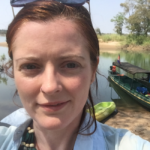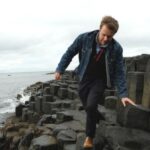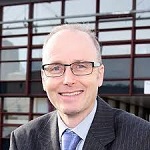ARISE Leadership Team
The ARISE Project is led by Gina Yannitell Reinhardt (University of Essex), and the leadership team includes colleagues from across Eastern Arc (including UEA, Essex and Kent), and others with world-leading expertise in their fields.
| ARISE Leadership Team | |
 |
Gina Yannitell Reinhardt is the Project Lead for ARISE. She is a professor in the Dept of Government at the University of Essex. She studies how citizens and policy makers make decisions under uncertainty, and how those decisions affect economic, social, and political development and subsequent policy outcomes. She focuses specifically on foreign aid, international development, and disasters, asking how development financing can be judiciously allocated to help avert, alleviate, mitigate, and manage disasters. Dr. Reinhardts work can be found in journals such as World Development, Political Analysis, Political Research Quarterly, the Journal of Risk Research, and the Review of Policy Research. |
| Image to follow | Emma McClelland is the Project Manager for ARISE. She is currently project manager for the Business and Local Government Data Research Centre at the University of Essex. |
 |
Chee Siang Ang (also known as Jim Ang) is Professor of Human-Computer Interaction in the School of Computing, University of Kent, and Kent and Medway Medical School. He is also Deputy Director of Institute of Cultural and Creative Industries. His main research interest lies in the general area of HCI (Human-Computer Interaction) with an emphasis on digital health. |
 |
Susan Barnet is an internationally exhibiting artist from Los Angeles now based at the University of Suffolk. Working across multiple media; including drawing, performance and installation, her practice employs anecdote and language towards a consideration of personal histories sited within larger political discourses. She received her MFA in film from the California Institute of the Arts and completed her PhD at Kingston University with an exhibition at the Stanley Picker Gallery. |
 |
Mark Bowler is Course Leader in Wildlife, Ecology and Conservation Science at the University of Suffolk. He works on wildlife distributions and the effects that human activity has on animal populations. He is also active in science communication and conservation. Current projects include: the spatial ecology of primates and other Amazonian mammals, bioacoustic wildlife surveys, camera trap surveys, bat activity in suburban and agricultural landscapes. |
 |
Julie Bremner is Energy and Food Security lead at the Cefas/University of East Anglia Collaborative Centre for Sustainable Use of the Seas (CCSUS), an Honorary Senior Lecturer at the UEA School of Environmental Sciences and facilitates Cefas’ Coastal Ecosystems science topic. She assesses and predicts the effects of human activities on marine biodiversity and ecosystem function, spanning most recently fishing, wind energy, nuclear energy and pollution. She researches seabed ecosystems, innovative methods of coastal monitoring, physics/ecology coupling and ecology to support environmental economics and social needs. |
 |
Aideen Foley is a Senior Lecturer in Environmental Geography at Birkbeck, University of London. Her research sits at the intersection between science and society, with an emphasis on how diverse climate and environmental data inform decision-making at local scales. She is particularly interested in environmental issues and decision-making in small islands. |
 |
Johanna Forster is Associate Professor in the Environment and Global Development. She is an environmental social scientist, with expertise in interdisciplinary, policy-relevant research that cross-cut development issues around marine and coastal resource management and governance, climate change, hazards and risk. She specialises in understanding multi-level perceptions, knowledge and incentives and the associated implications for environmental decision-making and governance. Along with Ben Little she is joint Associate Pro Vice-Chancellor (APVC) Civic, which encourages genuine grassroots engagement to support strategic and relational civic activities between the university, the city of Norwich and the East Anglia region. |
 |
Clement Garcia is a project co-lead for ARISE. He is a benthic ecologist at Cefas, the Centre for Environment, Fisheries and Aquaculture Science. His current work focuses on trophic relationships involving benthic invertebrates and, to a larger extent, the functioning of the benthic compartment as a whole. His work involves frequent use of modelling tool such as general steady-state mass-balanced model as well as Individual-based model. His belief is that a good understanding of ecological function is fundamental in order to apprehend the anthropogenic effects on natural system and therefore to provide sustainable advice on environmental management. |
 |
Natalie Hicks is a senior lecturer in the School of Life Sciences at the University of Essex |
 |
Philip Leifeld is a Professor of Comparative Politics at the University of Mancherster. . His research is mainly about political networks. He has published extensively on how policy networks operate, the role of interest groups and advocacy in policy formulation and decision making, and institutional design in international organisations. To this end, he has also contributed methodological innovations in the areas of network science and statistics, including network models for longitudinal data and associated statistical software packages. |
 |
Ben Little is an associate lecturer at the University of East Anglia. He is joint Associate Pro Vice-Chancellor (APVC) Civic with Johanna Forster, which seeks to develop partnerships to help improve the lives of our citizens and to share solutions. |
 |
Irene Lorenzoni is Professor of Society and Environmental Change at the University of East Anglia. Her research focuses on the relationships between individual perceptions and understandings of environmental issues – specifically climate change – and behaviours. An important component to her work is understanding how and why such responses are enabled or hindered, with a focus on societal and political processes shaping climate futures. Therefore her work also encompasses governance of climate change at various societal and geographical levels, both in relation to mitigating climate change and adapting to its effects. |
 |
Daniel Mills is a lecturer in Wildlife Conservation at Aberystwyth University. He is a passionate naturalist and environmental scientist interested in aquatic biodiversity and data-led conservation. His work focuses on applied ecological and environmental monitoring to support better management of anthropogenic impacts. In particular, to tackle issues such as pollution, over-abstraction, artificial river modifications and the spread of invasive non-native species. |
 |
Darryl Newport is Professor of Energy and Sustainable Development and the Director of the Suffolk Sustainability Institute at the University of Suffolk. He has a wide research interest, working in a wide range of interdisciplinary areas including areas relating to Infrastructure, resource management and the Built Environment with a focus on renewable and zero carbon energy solutions. The overarching aim of his research is to develop practical decarbonised solutions which can be delivered rapidly to enable effective mitigation of climate change. |
 |
Catherine Richardson is Professor of Early Modern Studies and Director of the Institute of Cultural and Creative Industries at the University of Kent. She has researched the birth of the creative industries, in drama and other performance cultures; in the development of skilled craft practices and the way they were shaped by international patterns of migration; and the way those cultural practices have evolved from the sixteenth century to the present. Recently, she has become fascinated by the access technology gives to engagement with the past, and with the new forms of making and doing that we create in relation to it. |
 |
Graham Underwood is a marine and freshwater biologist at the University of Essex , particularly interested in the interactions between microbes (algae – mainly diatoms, and bacteria), dissolved organic matter (DOC, DOM), nutrient cycling, biogeochemistry, and responses to environmental pressures (climate change, pollution). His research is based in the U.K., but he has also carried out research in the Baltic, Mediterranean and South African environments, tropical systems in the Indo-pacific and the Bahamas, and in Antarctic and Arctic sea ice, and high latitude lakes (Greenland). |
 |
Dragana Vidovic is the Research and Innovation Associate for ARISE. She was previously a Senior Research Officer with the Connected Communities Project, which was a social prescribing initiative being implemented in the UK and France, in collaboration with Local Authority Organisations and the University of Essex. She completed her Doctorate Degree in politics at the University of Essex in 2018. Prior to that, she worked at the University of Minnesota, Minnesota Center for Twin and Family Research (MCTFR) and studied psychology at the College of Saint Benedict, USA. |
 |
Jane Watt is senior lecturer in fine art at the University of Suffolk. She has developed modes of critical engagement in site-specific installation and writing through practice-based and field research. She has undertaken a number of large-scale temporary and permanent public art commissions and exhibited nationally and internationally. Jane is a Senior Fellow of the Higher Education Academy (SFHEA). |
